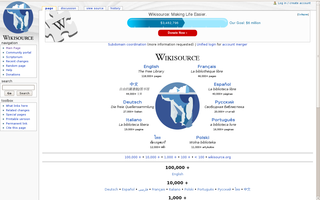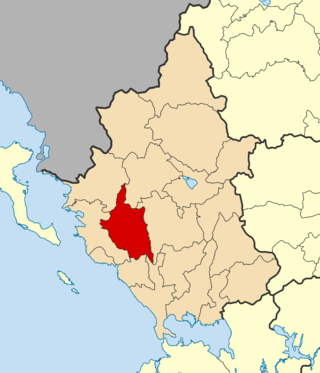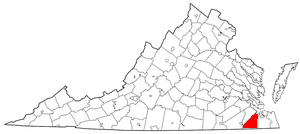
Siddhartha Gautama, most commonly referred to as the Buddha, was a wandering ascetic and religious teacher who lived in South Asia during the 6th or 5th century BCE and founded Buddhism.
Philology is the study of language in oral and written historical sources; it is the intersection of textual criticism, literary criticism, history, and linguistics. Philology is also defined as the study of literary texts as well as oral and written records, the establishment of their authenticity and their original form, and the determination of their meaning. A person who pursues this kind of study is known as a philologist.

The is a grammatical article in English, denoting persons or things already mentioned, under discussion, implied or otherwise presumed familiar to listeners, readers, or speakers. It is the definite article in English. The is the most frequently used word in the English language; studies and analyses of texts have found it to account for seven percent of all printed English-language words. It is derived from gendered articles in Old English which combined in Middle English and now has a single form used with pronouns of any gender. The word can be used with both singular and plural nouns, and with a noun that starts with any letter. This is different from many other languages, which have different forms of the definite article for different genders or numbers.

Exegesis is a critical explanation or interpretation of a text. The term is traditionally applied to the interpretation of Biblical works. In modern usage, exegesis can involve critical interpretations of virtually any text, including not just religious texts but also philosophy, literature, or virtually any other genre of writing. The phrase Biblical exegesis can be used to distinguish studies of the Bible from other critical textual explanations.

Wikisource is an online digital library of free-content textual sources on a wiki, operated by the Wikimedia Foundation. Wikisource is the name of the project as a whole and the name for each instance of that project ; multiple Wikisources make up the overall project of Wikisource. The project's aim is to host all forms of free text, in many languages, and translations. Originally conceived as an archive to store useful or important historical texts, it has expanded to become a general-content library. The project officially began on November 24, 2003 under the name Project Sourceberg, a play on the famous Project Gutenberg. The name Wikisource was adopted later that year and it received its own domain name.

The schools of Buddhism are the various institutional and doctrinal divisions of Buddhism that have existed from ancient times up to the present. The classification and nature of various doctrinal, philosophical or cultural facets of the schools of Buddhism is vague and has been interpreted in many different ways, often due to the sheer number of different sects, subsects, movements, etc. that have made up or currently make up the whole of Buddhist traditions. The sectarian and conceptual divisions of Buddhist thought are part of the modern framework of Buddhist studies, as well as comparative religion in Asia.
Untouchability is a form of social institution that legitimises and enforces practices that are discriminatory, humiliating, exclusionary and exploitative against people belonging to certain social groups. Although comparable forms of discrimination are found all over the world, untouchability involving the caste system is largely unique to South Asia.

Souli is a municipality in Epirus, northwestern Greece. The seat of the municipality is the town of Paramythia.
Bāṇabhaṭṭa was a 7th-century Sanskrit prose writer and poet of India. He was the Asthana Kavi in the court of the emperor Harsha, who reigned c. 606–647 CE in north India, first from Sthanvishvara (Thanesar), and later Kannauj. Bāna's principal works include a biography of Harsha, the Harshacharita, and one of the world's earliest novels, Kadambari. Bāṇa died before finishing the novel and it was completed by his son Bhūṣaṇabhaṭṭa. Both these works are noted texts of Sanskrit literature. The other works attributed to him are the Caṇḍikāśataka and a drama, the Pārvatīpariṇaya. Banabhatta gets an applause as "banochhistam jagatsarvam" meaning Bana has described everything in this world and nothing is left.

Sirogojno is a village in Serbia located on Mt. Zlatibor. The village of Sirogojno was declared a Monument of Culture of Exceptional Importance in 1983, and it is protected by the Republic of Serbia.

The Haryanka dynasty was the third ruling dynasty of Magadha, an empire of ancient India, which succeeded the Pradyota dynasty and Barhadratha dynasty. Initially, the capital was Rajagriha. Later, it was shifted to Pataliputra, near the present-day Patna in India during the reign of Udayin. Bimbisara is considered as the main founder of the dynasty.

Géberjén is a village in Szabolcs-Szatmár-Bereg county, in the Northern Great Plain region of eastern Hungary.

Saint-Martin-Lys is a commune in the Aude department in southern France.

Francis Patrick McFarland was an American Catholic bishop who served as the third Bishop of Hartford.

This is a list of the National Register of Historic Places listings in Suffolk, Virginia.
Sreemoolanagaram is a small town near Aluva and is a part of the Sreemoolanagaram Grama Panchayat. The Panchayat is a part of Aluva Taluk in Ernakulam District in Kerala, India. The Chowara village is a part of Sreemoolanagaram Panchayat.

Ohio History Connection, formerly The Ohio State Archaeological and Historical Society and Ohio Historical Society, is a nonprofit organization incorporated in 1885. Headquartered at the Ohio History Center in Columbus, Ohio, Ohio History Connection provides services to both preserve and share Ohio's history, including its prehistory, and manages over 50 museums and sites across the state. An early iteration of the organization was founded by Brigadier General Roeliff Brinkerhoff in 1875. Over its history, the organization changed its name twice, with the first occurring in 1954 when the name was shortened to Ohio Historical Society. In 2014, it was changed again to Ohio History Connection, in what members believed was a more modern and welcoming representation of the organization's image.
Maionia or Maeonia, was a city of the Hellenistic, Roman and Byzantine era located near the Hermos River, in ancient Lydia. Both Ramsay and Talbert tentatively identified the ancient polis with the modern village of Koula a village known for its carpet manufacture.
Chok is a village in Jesar Taluka of Bhavnagar district, Gujarat, India. It is a former petty Rajput princely state.

Gojëmadhi (Goljemadi, was an Albanian tribe that lived in the Middle Ages. They inhabited the Lješanska nahija region of Old Montenegro, being centered in the area around the village of Goljemadi, west of modern Podgorica.












